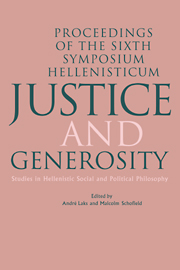 Justice and Generosity
Justice and Generosity Book contents
- Frontmatter
- Contents
- Preface
- Introduction
- PART I POLITICAL PHILOSOPHY: DEVELOPMENT AND TRANSFORMATION
- PART II THE ETHICAL FRAMEWORK OF POLITICS AND SOCIETY
- 6 The Epicurean theory of law and justice
- 7 Two Stoic approaches to justice
- 8 Cicero's politics in De officiis
- 9 Politics and paradox in Seneca's De beneficiis
- Bibliography
- General index
- Index of Greek and Latin words
- Index of ancient names and philosophical schools
- Index of passages
9 - Politics and paradox in Seneca's De beneficiis
from PART II - THE ETHICAL FRAMEWORK OF POLITICS AND SOCIETY
Published online by Cambridge University Press: 15 October 2009
- Frontmatter
- Contents
- Preface
- Introduction
- PART I POLITICAL PHILOSOPHY: DEVELOPMENT AND TRANSFORMATION
- PART II THE ETHICAL FRAMEWORK OF POLITICS AND SOCIETY
- 6 The Epicurean theory of law and justice
- 7 Two Stoic approaches to justice
- 8 Cicero's politics in De officiis
- 9 Politics and paradox in Seneca's De beneficiis
- Bibliography
- General index
- Index of Greek and Latin words
- Index of ancient names and philosophical schools
- Index of passages
Summary
By the standards of any contemporary western political culture, ancient societies, both Greek and Roman, were strikingly hierarchical. Only in the programmatic dreams of the most wild-eyed reformers could we expect to find an ideological commitment to general social equality. Of course, the notion that there should be equality of political rights among those fortunate enough to be classed as full citizens was somewhat commoner. But what we might call the ‘real world’ of social relations was based on dramatic differences in status, power, and wealth, which few if any could seriously imagine challenging.
From the fourth century BC onwards political and social thinkers were reflectively aware of the important role played in such a society by the doing of ‘good deeds’, services or gifts to other members of society for which some sort of return, even if only the expression of gratitude, was normally expected. Although the idea is in some form as old as Greek culture itself, it is fitting that we find clearly expressed in a pseudo-Aristotelian letter to Philip of Macedon the notion that such good deeds and the return for them served to ‘hold together’ (sunechein) society.
Most philosophers have claimed that doing good deeds is godlike. For, simply put, the giving and interchange of favour (charis) holds together the lives of men, some giving, some receiving, and some giving back in return. […]
- Type
- Chapter
- Information
- Justice and GenerosityStudies in Hellenistic Social and Political Philosophy - Proceedings of the Sixth Symposium Hellenisticum, pp. 241 - 265Publisher: Cambridge University PressPrint publication year: 1995
- 9
- Cited by


